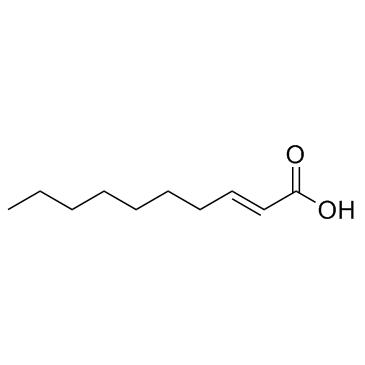
trans-2-Decenoic acid
CAS No. 334-49-6
trans-2-Decenoic acid( (E)-2-Decenoic acid )
Catalog No. M20740 CAS No. 334-49-6
Trans-2-Decenoic acid is an unsaturated fatty acid found in royal jelly produced from the hypopharyngeal and mandibular gland secretions of honeybees.
Purity : >98% (HPLC)
 COA
COA
 Datasheet
Datasheet
 HNMR
HNMR
 HPLC
HPLC
 MSDS
MSDS
 Handing Instructions
Handing Instructions
| Size | Price / USD | Stock | Quantity |
| 25MG | 45 | In Stock |


|
| 50MG | 60 | In Stock |


|
| 100MG | Get Quote | In Stock |


|
| 200MG | Get Quote | In Stock |


|
| 500MG | Get Quote | In Stock |


|
| 1G | Get Quote | In Stock |


|
Biological Information
-
Product Nametrans-2-Decenoic acid
-
NoteResearch use only, not for human use.
-
Brief DescriptionTrans-2-Decenoic acid is an unsaturated fatty acid found in royal jelly produced from the hypopharyngeal and mandibular gland secretions of honeybees.
-
DescriptionTrans-2-Decenoic acid is an unsaturated fatty acid found in royal jelly produced from the hypopharyngeal and mandibular gland secretions of honeybees.
-
In Vitro(E)-2-Decenoic acid is isolated along with 10-hydroxy-trans-2-decenoic acid, a fatty acid unique to royal jelly. (E)-2-Decenoic acid and 10-hydroxy-trans-2-decenoic acid are both described to demonstrate estrogenic activity, where the fatty acids demonstrate inhibition of 17β-estradiol binding to estrogen receptor-β.
-
In Vivo——
-
Synonyms(E)-2-Decenoic acid
-
PathwayOthers
-
TargetOther Targets
-
RecptorOthers
-
Research Area——
-
Indication——
Chemical Information
-
CAS Number334-49-6
-
Formula Weight170.25
-
Molecular FormulaC10H18O2
-
Purity>98% (HPLC)
-
SolubilityDMSO:100 mg/mL (587.37 mM)
-
SMILESCCCCCCC\C=C\C(O)=O
-
Chemical Name——
Shipping & Storage Information
-
Storage(-20℃)
-
ShippingWith Ice Pack
-
Stability≥ 2 years
Reference
1.Ramiro Vílchez André Lemme Ballhausen B et al. Streptococcus mutans Inhibits Candida albicans Hyphal Formation by the Fatty Acid Signaling Molecule trans-2-Decenoic Acid (SDSF)[J]. Chembiochem 2010 11(11):1552-1562.
molnova catalog



related products
-
Cls-Aconitic acid
Cls-Aconitic acid is the cis-isomer of Aconitic acid.is an intermediate in the tricarboxylic acid cycle produced by the dehydration of citric acid.
-
Ebracteolata cpd B
Ebracteolata cpd B is a natural product for research related to life sciences.
-
4,6-Benzilidine-D-Gl...
4,6-Benzilidine-D-Glucose is a clinical antitumor compound showing antitumor activity in rats with chemically induced hepatocellular carcinoma.



 Cart
Cart
 sales@molnova.com
sales@molnova.com


